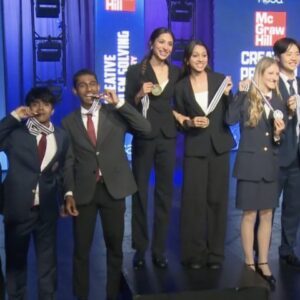This article was originally published in the summer 2013 Harker Quarterly.
For Harker students looking for a unique and engaging way to address global issues, the Future Problem Solving (FPS) program has been a mainstay for more than 15 years. “FPS is a great program,” said Olivia Zhu ’11, who began participating in FPS in grade 7. “I think that students get an amazing opportunity to learn a lot of fundamental skills that they perhaps wouldn’t get the chance to develop as much in traditional classes.”
Started in 1974 by Georgia-based psychologist Ellis Paul Torrance, FPS now boasts participation by more than 250,000 students in grades 4-12 worldwide each year. At Harker, the program is offered to students in grades 6-12. Middle school history teacher Cyrus Merrill took over the Harker program during the 1998-99 school year, and with the key involvement of upper school computer science teacher Susan King and middle school math teacher Margaret Huntley, it has since experienced immense growth and success. In addition to winning a number of categories at every competition they’ve attended since 2002, Harker FPS students have won the privilege to compete at the international finals for 10 years running.
“It’s very exciting for the kids because there are teams that are doing this in Singapore, China, Australia, New Zealand; so they meet all these [students from] different schools,” Merrill said. “We’ve become sort of the powerhouse school in the state, so routinely we send multiple teams to internationals, and last year we took first place in the senior team [category].”
Each year, Future Problem Solving Program International (FPSPI) chooses topics that form the basis of the problems that students will solve at state-level and international competitions. Topics have included everything from neurotechnology to alternative energy to celebrity culture.
Students perform their own research on these topics in preparation for receiving the scenarios that FPSPI will eventually distribute to the many participating schools. Using the topic as the major theme, these scenarios describe a troubling situation 30 years into the future for which students must devise solutions.
The process starts with students – either as teams or individuals – coming up with a number of challenges the scenario presents, such as negative environmental impact, economic recession or public health problems. Each of these challenges must integrate different categories or aspects of society affected by the challenges that are defined by FPSPI, such as government, technology, economics, religion and so on.
After identifying the challenges, students work on finding and summarizing an “Underlying Problem,” an especially important challenge posed by the future scenario. The students then formulate a number of possible solutions (16 for teams, eight for individuals) to the underlying problem and develop criteria by which to evaluate them.
Criteria can include cost-effectiveness, benefit to society, ease of implementation and other factors.
After selecting what they deem to be the best solution, students then come up with an action plan that would be used to roll it out. During competition this entire process takes place in a two-hour time period, which can seem a formidable task for many first-time FPS competitors. Luckily, students have the opportunity to go through a practice round at their respective schools, which FPSPI also uses as a means of getting feedback on the chosen topic.
“FPS focuses on developing good research skills, critically analyzing a situation, developing solutions and an action plan and then presenting that plan concisely and convincingly,” said Zhu. “Condensing those steps in a single process provides fundamental and important training that is useful for academic work in high school and college, extracurriculars and so much more. The possibilities and applications really are endless.”
Merrill feels one reason for Harker’s continued success in FPS competitions is the mentorship provided to middle school FPS students by members of the upper school FPS club, who have already been competing for a number of years by the time they become upper school students.
“It’s daunting to learn how to do all this the first time around, but their training of the younger kids works really well, and of course they’re also role models when the kids look up to them,” Merrill said.
For the most part, Merrill tries to limit his role in the process in order to encourage the students to become reliant on their own critical thinking and problem-solving skills. “My goal in teaching is to fire myself from the process,” he said, later adding, “To me, my goal is to motivate students to do things on their own, and I want them to develop leadership skills and concepts.”
Another skill that develops during involvement in FPS, and one that has earned Harker students many awards in state and international competitions, is presentation. This portion of the competition, which often has Harker students performing skits with musical numbers featuring adaptations of modern pop songs with altered lyrics, have also become a source of confidence for the students, as well as a nice break from an otherwise heavily analytical process. “It’s giving confidence and presentation skills which are completely different from the analytical writing,” Merrill said.
“In my first year participating in seventh grade, I was extremely shy about getting on stage and speaking in front of crowds,” said Shelby Rorabaugh, grade 12, who started with FPS in grade 7. “So when Mr. Merrill told us we would all have to sing and dance and make silly puns in ridiculous garbage bag costumes in front of a full auditorium, I was terrified.” Though she disliked the presentation aspect of the competition at first, it later became something she enjoyed. Two years after her first appearance, her team’s presentation won first place at the international competition. “I could hardly believe the progress I made from that shy seventh grader, fumbling around stage with a quiet voice,” she said. “Just two years later, I would be winning my first major award at internationals.”
FPS also contains a scenario-writing competition, in which students compose short stories based on one of the competition topics. Earlier this year, Rorabaugh was named the first place international winner in scenario writing, becoming the first Harker student to win this honor. She has qualified for internationals in scenario writing in every competition since she began competing in grade 8 and said that her creative writing skills have since dramatically improved. Her proudest achievement, however, has been helping the upper school FPS club become more established. “I couldn’t be more proud of my fellow senior club members,” she said. “We’ve really worked hard to improve the high school portion of FPS, since it is relatively student-driven in its leadership compared to the middle school division.”
Several years ago, Merrill decided to offer a parting gift to the graduating seniors of Harker’s FPS program. He settled on rubber ducks, “because when you buy rubber ducks they come in themed sets of four,” one for each team member. It has since become a fun and revered tradition of the program, and rubber ducks of many different sizes can be seen in various places around Merrill’s classroom.
Rorabaugh has called her decision to join FPS “the best decision of my life. I came because of friends, and I stayed for the quirky community of friends and faculty and the learning environment.”

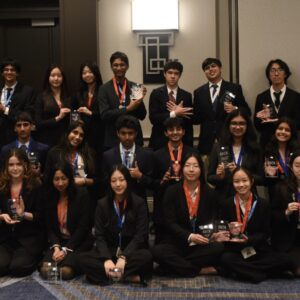

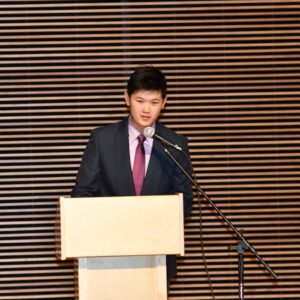
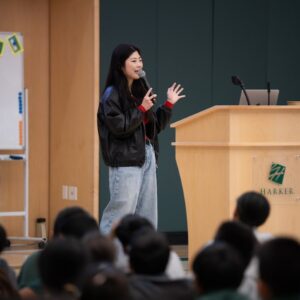
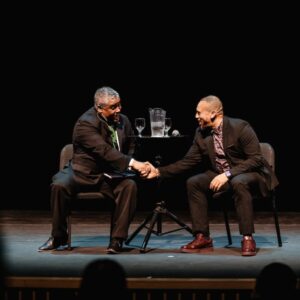
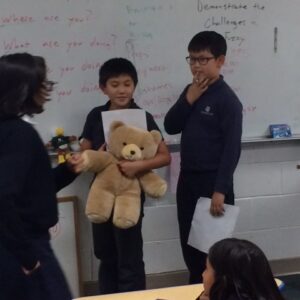

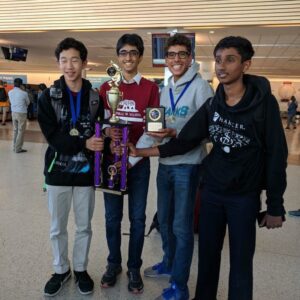
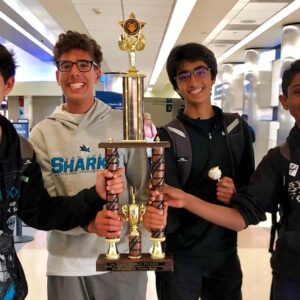

![[UPDATED] Future Problem Solving Team Advances to Finals at International Competition IMG_0022](https://news.harker.org/wp-content/uploads/2016/04/IMG_0022-e1461013196982-300x300.jpg)
